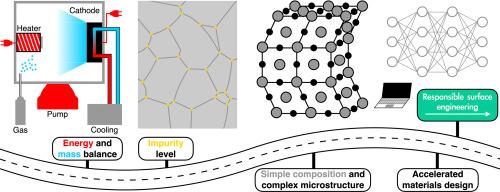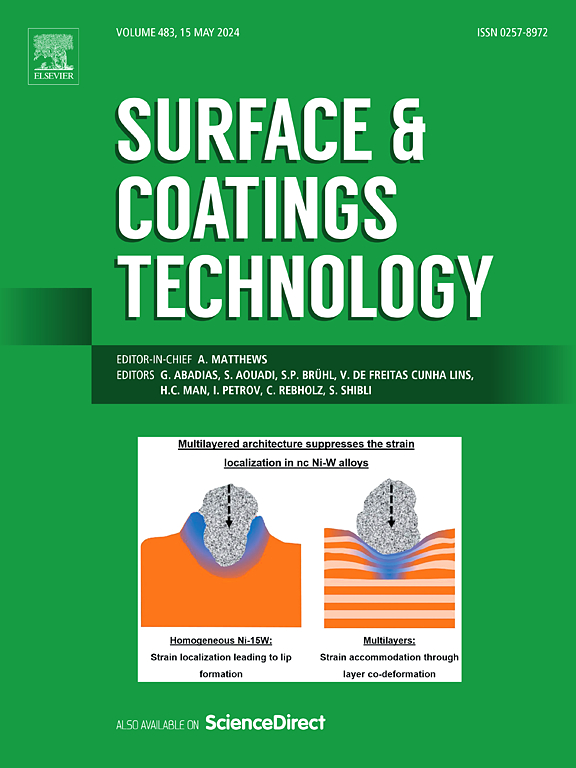Perspective on pathways towards responsible surface engineering
IF 6.1
2区 材料科学
Q1 MATERIALS SCIENCE, COATINGS & FILMS
引用次数: 0
Abstract
In this perspective sustainability-relevant aspects of modern surface engineering technologies, which enable improved structural and functional surface properties, are critically evaluated. Although plasma-assisted physical vapour deposition (PVD) is increasingly employed to address global challenges, such as energy efficiency and reduction of CO2 emissions, their inherently resource-intensive nature is often not considered.
Surface engineering research should thus embrace sustainability-relevant aspects from a processes and materials design point of view. While we are convinced that sustainability-relevant surface engineering has to be based on synchronised process and materials solutions, we will discuss processes and materials separately.
In terms of processes, we are going to describe the challenges of state-of-the-art technology, including energy and mass balances as well as product cycles. With respect to materials, the coating and process purity as well as chemical and microstructural complexity are discussed.
Such approaches are fully in line with the United Nations Sustainable Development Goal 12 Responsible Consumption and Production. We expect that the here discussed urgently needed pathways towards responsible surface engineering will become important for the surface engineering community and adopted within the near future. Responsible surface engineering includes the human behaviour and necessitates a change in mindset of materials scientists and process engineers. Hence, two main questions are critically evaluated in this perspective:
- 1)What are sustainability-relevant aspects of PVD processes and materials?
- 2)Which pathways are available to move towards responsible surface engineering?

实现负责任的表面工程的途径透视
从这个角度出发,对现代表面工程技术的可持续性相关方面进行了批判性评估,这些技术能够改善结构和功能表面特性。虽然等离子体辅助物理气相沉积(PVD)越来越多地被用于应对能源效率和减少二氧化碳排放等全球性挑战,但其固有的资源密集型性质却往往未被考虑在内。我们深信,与可持续发展相关的表面工程必须以同步的工艺和材料解决方案为基础,因此我们将分别讨论工艺和材料。这些方法完全符合联合国可持续发展目标 12 "负责任的消费和生产"。我们预计,这里讨论的实现负责任的表面工程的急需途径将在不久的将来成为表面工程界的重要内容并被采用。负责任的表面工程包括人类行为,需要材料科学家和工艺工程师转变观念。因此,我们从这个角度对两个主要问题进行了批判性评估:1)PVD 工艺和材料的可持续性相关方面有哪些?
本文章由计算机程序翻译,如有差异,请以英文原文为准。
求助全文
约1分钟内获得全文
求助全文
来源期刊

Surface & Coatings Technology
工程技术-材料科学:膜
CiteScore
10.00
自引率
11.10%
发文量
921
审稿时长
19 days
期刊介绍:
Surface and Coatings Technology is an international archival journal publishing scientific papers on significant developments in surface and interface engineering to modify and improve the surface properties of materials for protection in demanding contact conditions or aggressive environments, or for enhanced functional performance. Contributions range from original scientific articles concerned with fundamental and applied aspects of research or direct applications of metallic, inorganic, organic and composite coatings, to invited reviews of current technology in specific areas. Papers submitted to this journal are expected to be in line with the following aspects in processes, and properties/performance:
A. Processes: Physical and chemical vapour deposition techniques, thermal and plasma spraying, surface modification by directed energy techniques such as ion, electron and laser beams, thermo-chemical treatment, wet chemical and electrochemical processes such as plating, sol-gel coating, anodization, plasma electrolytic oxidation, etc., but excluding painting.
B. Properties/performance: friction performance, wear resistance (e.g., abrasion, erosion, fretting, etc), corrosion and oxidation resistance, thermal protection, diffusion resistance, hydrophilicity/hydrophobicity, and properties relevant to smart materials behaviour and enhanced multifunctional performance for environmental, energy and medical applications, but excluding device aspects.
 求助内容:
求助内容: 应助结果提醒方式:
应助结果提醒方式:


